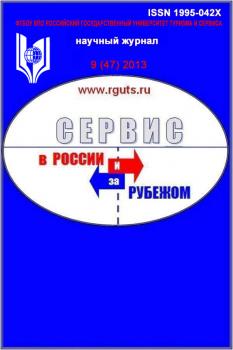The article draws a parallel between the concepts of “tourism cluster “and “territorial recreational system” (TRS) and notes the importance of the information sector in modern society and its influence on the development of TRS. Special attention is paid to sustainable development of the territory against the preservation of traditional landscapes. The authors investigate TRS of wine tourism, based on the wine production and tasting-cognitive ac- tivity in terms of Stavropol wineries (Budennovsk-Levokumskij and Kavminvodsky). Using the example of St. Michael-Athos monastery in settlement Pobeda of the Republic of Adygea, the authors research TRS of religious tourism developing on the basis of natural and cultural heritage and anthropogenic resources. By the example of Uchkulanskaya district of the Republic of Karachay-Cherkessia the article analyzes sports tourism as a combination of four components - health-related, cultural-cognitive, competitive, spiritual and sacred, and also TRS, formed as a result of interaction of these elements. This study has revealed that the cluster approach combined with the idea of conservation of natural territorial complexes allows to make tourism a multifaceted in a particular area, even if there is one form of tourism within the specific TRS, amidst the natural aesthetics of the surrounding landscape. Comprehensive approach to development and planning of tourism can contribute to the territory sustainable development as a whole.
туристский кластер, территориальная рекреационная система, рекреация, религиозный туризм, винный туризм, спортивный туризм, туристская подсистема, устойчивое развитие туризма
1. Zorin I.V. Territorial and recreational systems (studies of socio-economic forming factors and properties). Candidate of Geographical dissertation: author’s abstract. Moscow, 1973. 25 p.
2. Kvartal´nov V.A. Tourism: Theory and Practice. Moscow: Finance and Statistics, 2003. 672 p.
3. Koroleva N.V. Recreational zone as structural unit of the territorial states economy // Vestnik Adygejskogo gosudarstvennogo universiteta [Bulletin of Adygeya State University]. Series 5: Economics. 2011. № 4. Pp. 259-269.
4. Mazhar L.Yu. Territorial tourism and recreation systems. Smolensk: Universum, 2008. 212 p.
5. Mazhar L.Yu. Spatial and temporal organization of tourism and recreation activities // Vestnik Rossijskogo gosudarstvennogo universiteta im. I. Kanta [IKBFU´s Vestnik]. Series: Natural Sciences. 2008. №1. Pp. 100-104.
6. Nikolaenko D.V. Recreational geography. Moscow: Vlados, 2003. 224 p.
7. Preobrazhenskij V.S. Theoretical Foundations of Recreational Geography. Moscow: Nauka, 1975. 260 p.
8. Butler R., Hinch T. Tourism and Indigenous Peoples: Issues and Implications. London: Butterworth
9. Goeldner C.R., Ritchie J.R.B. Tourism: principles, practices, philosophies. Hoboken, New Jersey: John Wiley & Sons Inc., 2009. 655 p.
10. Hall C.M. Tourism, rethinking the social science of mobility. Harlow: Prentice-Hall, 2005. 448 p.
11. Holden A. Tourism Studies and the Social Sciences. London: Routledge, 2006. 228 p.
12. Mill R.C., Morrison A.M. The Tourism System. Dubuque, Iowa: Kendall/Hunt Publication, 2009. 436 p.





